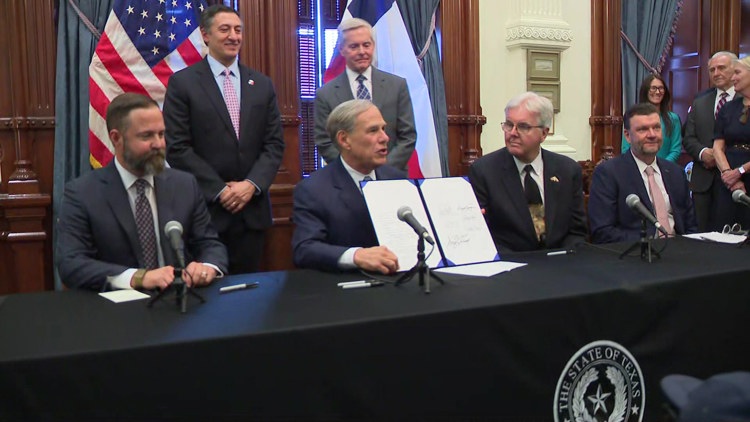AUSTIN, Texas — On Wednesday, Texas Gov. Greg Abbott signed a bill that aims to streamline state regulation and reduce unnecessary rules. It is the first bill the governor has signed that has passed through both chambers during the 89th Legislative session.
The bill follows the Trump administration's efforts to cut the federal government. The governor signed the bill at a ceremony at his office inside the Texas Capitol on Wednesday, joined by Lt. Gov.

Dan Patrick, who leads the Senate, House Speaker Dustin Burrows (R-Lubbock) and the two lawmakers who authored the legislation: State Sen. Phil King (R-Weatherford) and State Rep. Giovanni Capriglione (R-Southlake).
Business leaders, including National Federation of Independent Business Texas State Director Jeff Burdett and Texas Association of Business President and CEO Glenn Hamer, were also present for the signing. Senate Bill 14, named the "Regulatory Reform and Efficiency Act," would create an efficiency office at the state level, similar to Elon Musk's Department of Government Efficiency (DOGE) at the federal level. Abbott said the regulatory environment in Texas is too burdensome, and was "shocked" to see a study showing that Texas had the fifth-highest regulatory burden of any state in the United States.
Abbott referred to the statistic as "completely unacceptable." "It will impose stricter standards on new regulations, to hinder the imposition of regulations that could prove costly to doing business," Abbott said. "It will check the growth of the administrative state in Texas altogether.
" SB 14 aims to improve how state agencies in Texas create and enforce regulations. Additionally, Abbott said cutting red tape will help the Texas economy grow. "What this law is going to do is to make government more efficient and less costly," Abbott said.
"It will ensure that Texas is operating at the speed of business, and it will make it easier for our fellow Texans to deal with their state government." SB 14 would establish the Texas Regulatory Efficiency office within the governor's office. The governor will appoint members to an efficiency panel to oversee reform and process streamlining, which will be made up of business owners, researchers, state agencies and the public.
The bill would also establish an online portal for the public to review state regulations quickly. Republicans have controlled all aspects of Texas politics for more than two decades, but Abbott said the new office is not a sign Republicans have mismanaged the state for the past 20 years. "We want to have a clear review of all of our agencies where we can trim, and how we can save businesses money, how we spend taxpayers money so that they will continue to come here and create jobs and add to our economic viability and competitiveness," Patrick said.
"Texas DOGE will make us more transparent than ever to every citizen, cut most of the red tape and make us as efficient as possible, attracting more businesses, creating more jobs and saving taxpayer money." The goal is to reduce the number of rules and other regulatory requirements. Burrows said they want to eliminate unnecessary regulations, reduce training hours, simplify forms, reduce fees and create more waivers or exemptions.
"Texas citizens deserve plain English regulations so you can understand what they mean. They deserve to know what they do and make sure they're consistent and as few as possible," Burrows said. "What this bill is going to do is to provide an efficient regulatory framework.
It is going to reduce the number of regulations, and what I believe is the fewer regulations we have, the more efficient they are, and the easier they are to understand. This is going to help Texas's business and economy continue to boom." The bill, introduced by Sen.
King, passed the Senate last month and went through the new Delivery of Government Efficiency (DOGE) Committee in the Texas House before it was debated on the House floor. It is one of the first bills to make it through the state committee, which is tasked with investigating fraud, waste and inefficiencies in Texas state government. The bill limits the deference courts give to agency interpretations of laws and rules.
If SB 14 becomes law, courts won't be required to defer to an agency's interpretation of a statute or rules. The courts can still consider the agency's position if it doesn't conflict with the law. In a 6-3 ruling last summer , the U.
S. Supreme Court overturned a 1984 decision known as Chevron, which instructed lower courts to defer to federal agencies when laws passed by Congress are not crystal clear. Under the bill, the Efficiency Office will be required to create a manual for state agencies to follow to reduce regulatory burdens on Texans.
Abbott said there are plenty of regulations that should be eliminated. "I think there's low-hanging fruit all over the place. When you look at the vast amount of regulations, there's so much slicing and dicing that can and needs to be done," Abbott said.
"We will look to accelerate the process, to make sure we start slashing a way to make government more efficient as quickly as possible." The Efficiency Office will have to submit a biennial report detailing its activities, findings and recommendations to the governor and the Legislative Budget Board. Patrick pointed out that this is one of the earliest bill signings in a long time, something he credits to the relationship between himself, the governor and the House Speaker.
This is significant given how fraught the relationship between the two chambers has been in recent years. "We are working collaboratively together better than any time that I've been governor," Abbott said on Wednesday. "I think that that same collaboration will seep into and be a part of both the House and the Senate.
" Abbott said that when the session ends, it will go down as one of the most successful in more than a decade..
Politics

Gov. Greg Abbott signs 'Texas DOGE' bill into law

The bill creates an efficiency office to streamline Texas regulations, reduce unnecessary rules and improve public access to regulatory information.















